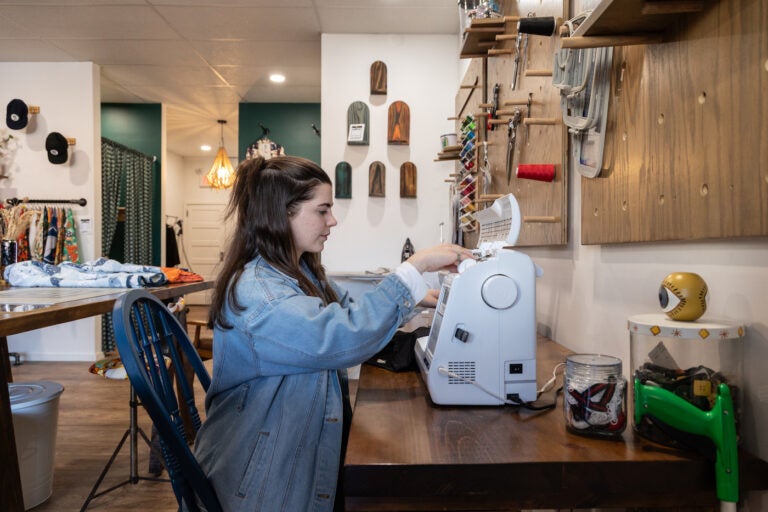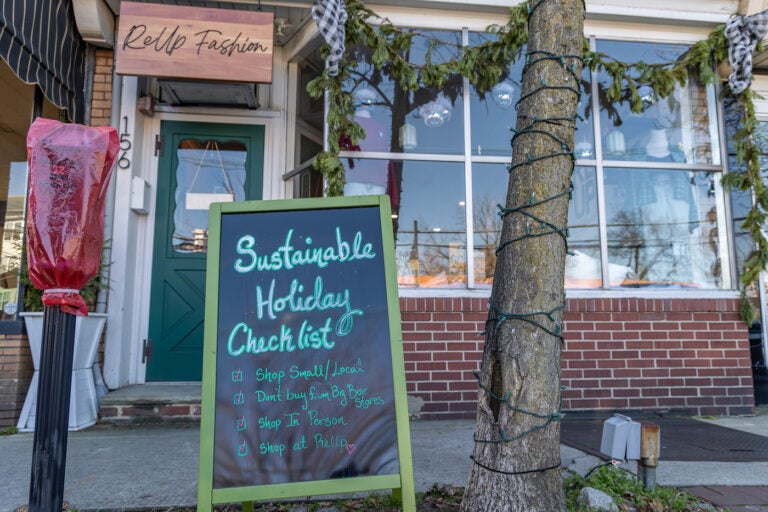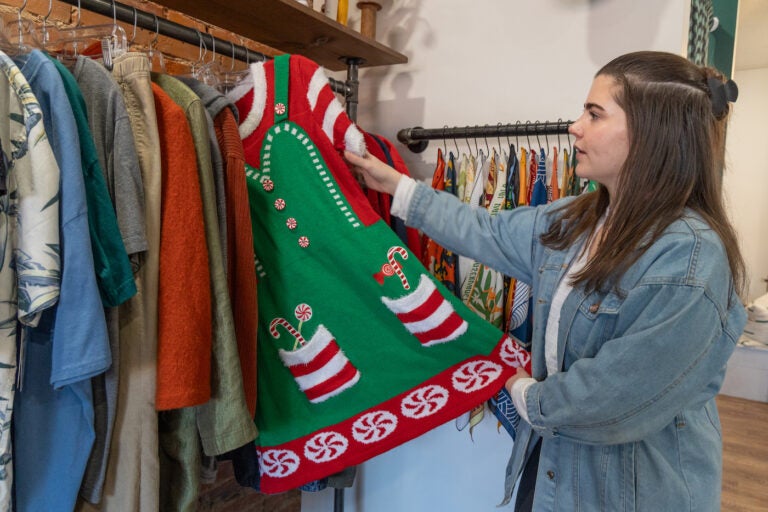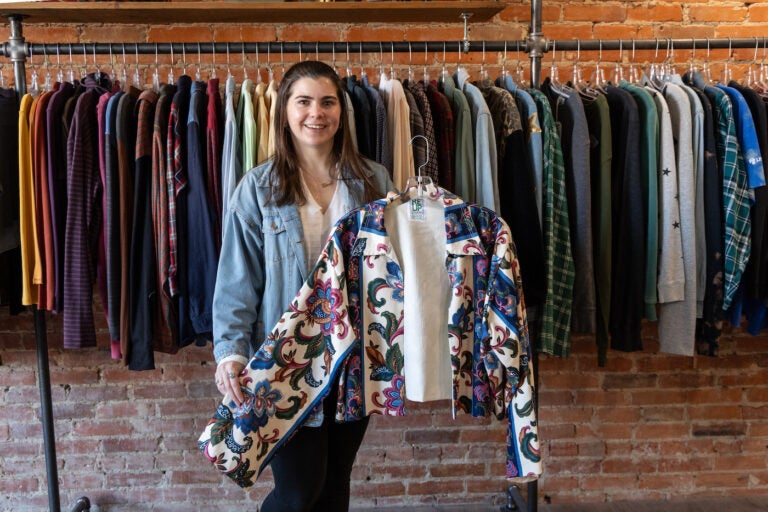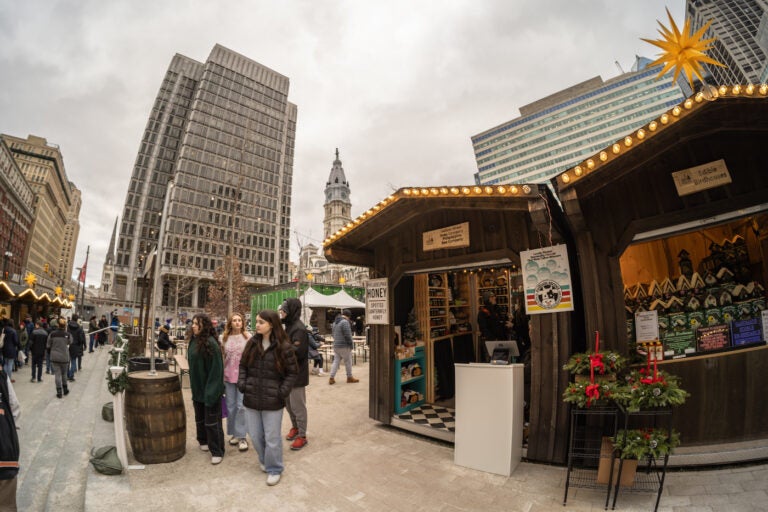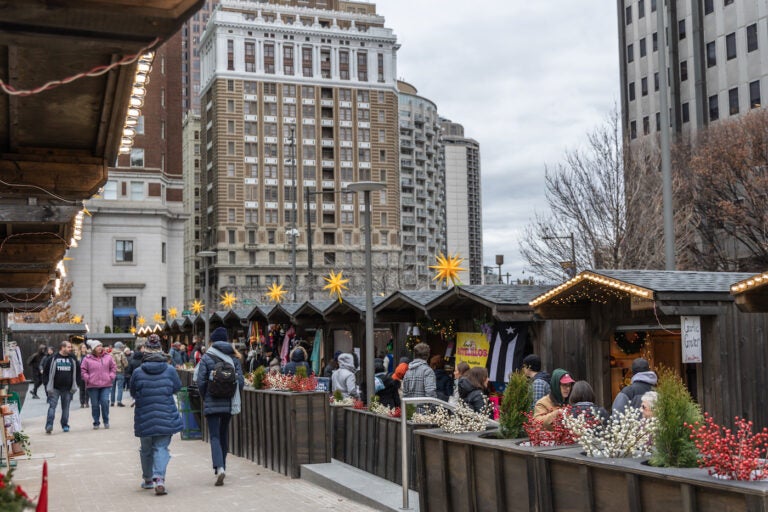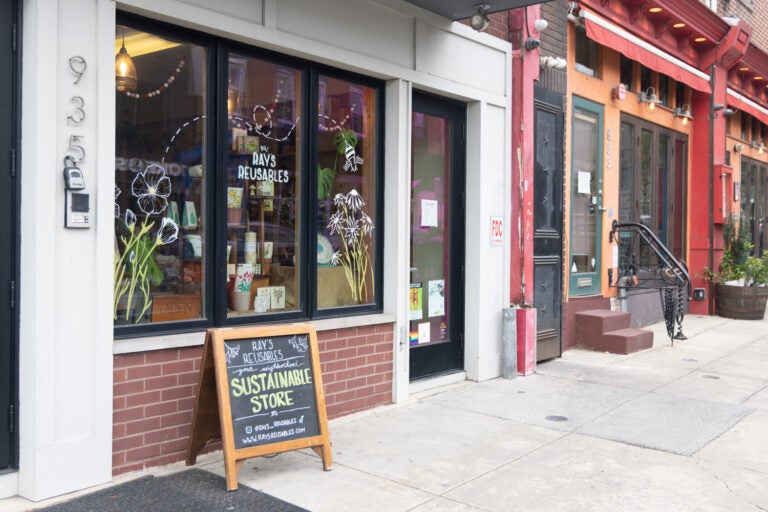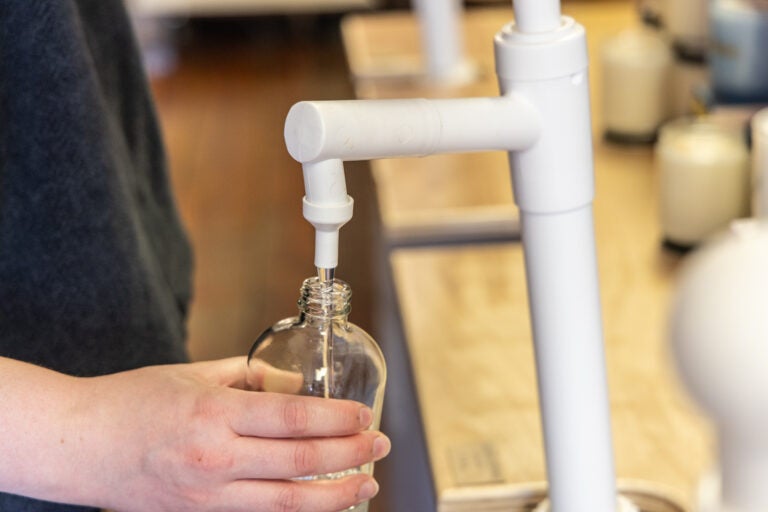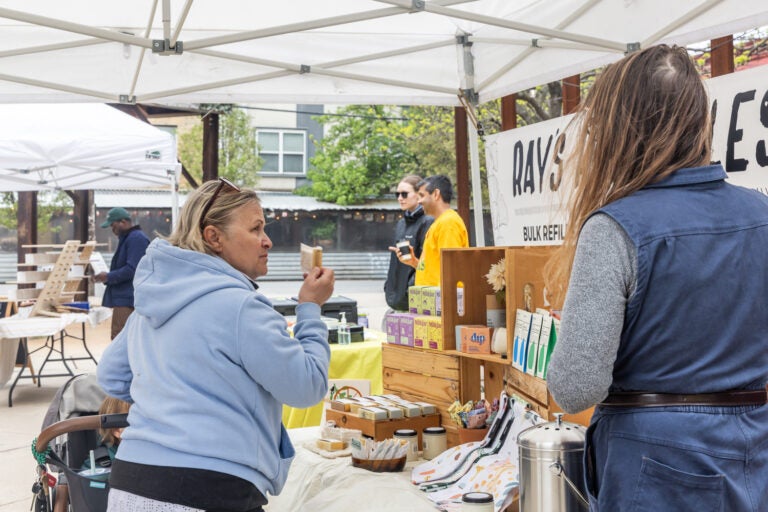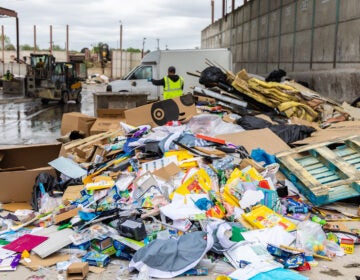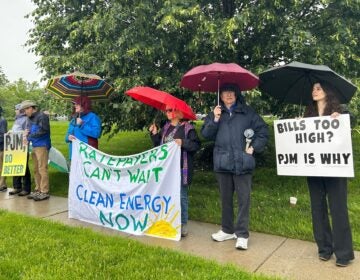Looking to cut down on plastics? These Philly-area stores could help
Advocates say corporations need to change their practices to tackle plastics pollution. In the meantime here are some local options for those looking to cut their consumption.
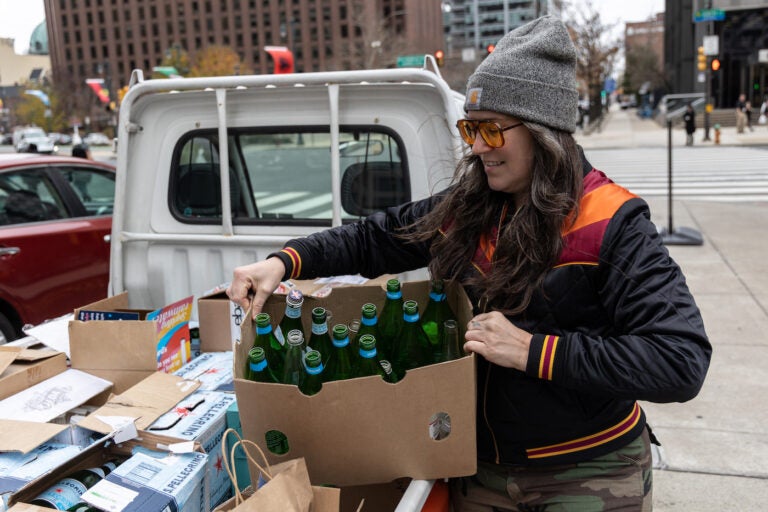
Melissa Lynn Torre, founder of the Vellum Street Soap Company, with recycled glass jars and bottles she uses to package the skin products she creates and sells. (Kimberly Paynter/WHYY)
From Philly and the Pa. suburbs to South Jersey and Delaware, what would you like WHYY News to cover? Let us know!
On a typical Saturday morning at the East Falls farmer’s market near the Schuylkill River Trail, beneath the din of traffic rolling along Roosevelt Boulevard above, vendors mix with shoppers looking for fresh vegetables, coffee, and locally made products like hot sauce and bar soaps.
Standing by Ray’s Reusables, which offers soaps and cleaning supplies in reusable containers, Mary Andracchio said she wants to do all she can to reduce her own consumption of throw-away plastic containers.

“I live in a community where there’s a lot of trash on the ground and I also try to clean that up as much as I can but it’s tricky,” said Andracchio.“We all know that plastics really don’t get recycled.”
Andracchio started her individual journey toward sustainability after reading an article about how one billion plastic toothbrushes are thrown away each year worldwide.

Melissa Valliant, a spokesperson for the group Beyond Plastics, said the burden should not be on people like Andracchio to reduce their consumption of polluting plastics, but rather on large corporations, who need to be held accountable.
“One of the industry’s early ‘solutions’ to plastic waste was simply to collect it in landfills,” Valliant said.
Valliant said consumers have been tricked into thinking that they are responsible for the plastics crisis. The plastics industry, she said, knew for decades that plastics could not be diverted from landfills.
“And instead of sharing that with the public, they went the opposite direction and launched a multimillion-dollar ad campaign to convince the public that plastic recycling would work if they just put the right things in [their recycling bins], ” Valliant said.
However, there are a few options for people like Andracchio who are tired of adding to the plastics waste stream.
Ray’s Reusables
Ray Daly was already interested in reducing her own waste before COVID, but once it hit, she noticed those around her moving toward more single-use items. In response to the proliferation of waste, she kicked off Ray’s Reusables, a refillable products shop.
Daly began her business as a mobile store set up around the neighborhood, repurposing denim and making reusable towels. By the end of 2020, it had become a permanent storefront in Northern Liberties, where she also helped educate consumers.
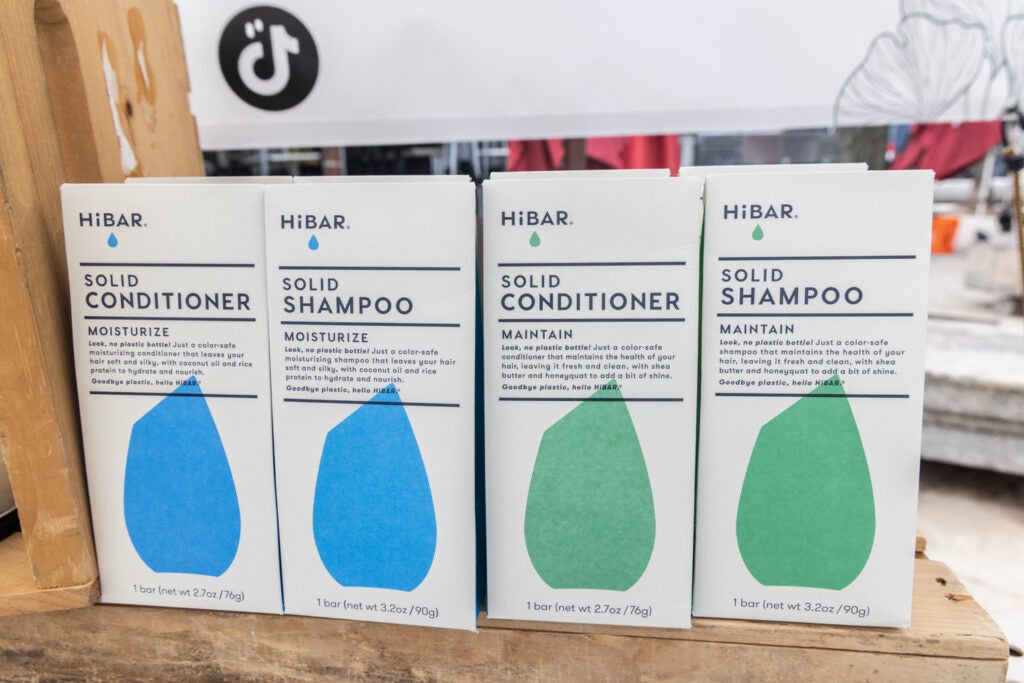
“We help people see possibilities for how they can reduce waste in their life,” Daly said. “We’re also here to act as a resource for people who are maybe new to [eliminating waste] and have questions about where they can start,” Daly said.
Ray’s Reusables travels to pop-up events around the city and attends farmer’s markets, including those in Clark Park and East Falls, twice a month. The business also makes its own in-house products, like bar soaps, shower steamers and paperless towels.
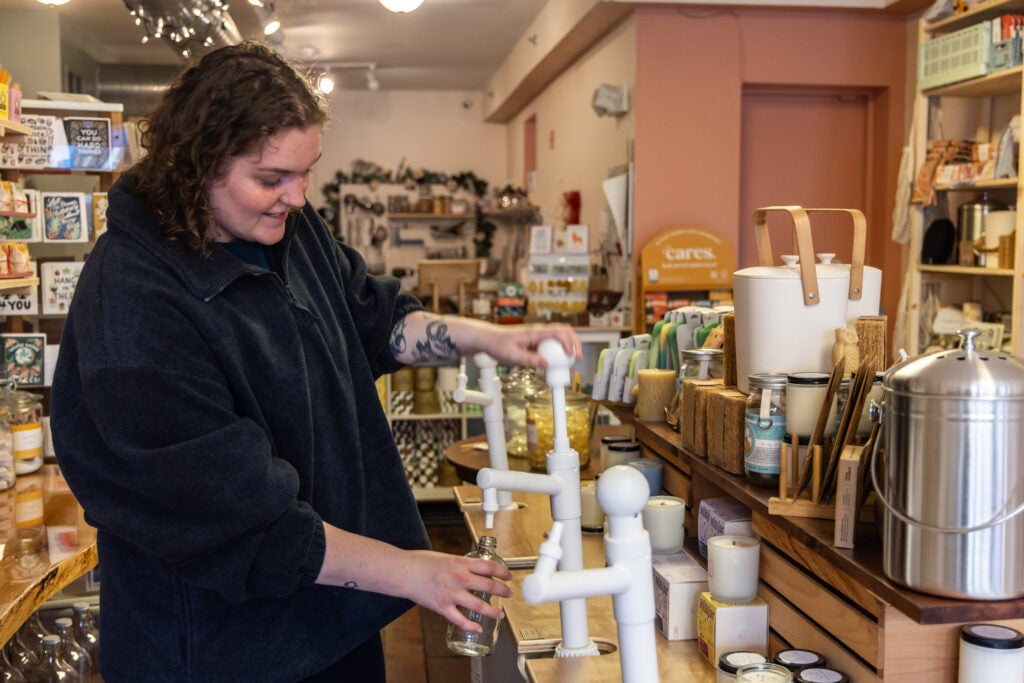
Vellum Street
Vellum Street was founded in 2015 by Melissa Lynn Torre, a chef looking for locally sourced ingredients that are healthy for both people and the environment. After her grandmother suggested bacon fat to help treat her eczema, she discovered tallow as an effective skincare ingredient. Tallow is made from beef fat and, while obviously not vegan, is great for people who have sensitive skin, she said. It has the additional benefit of helping small farmers utilize the entire animal, thereby reducing fat from the waste stream.
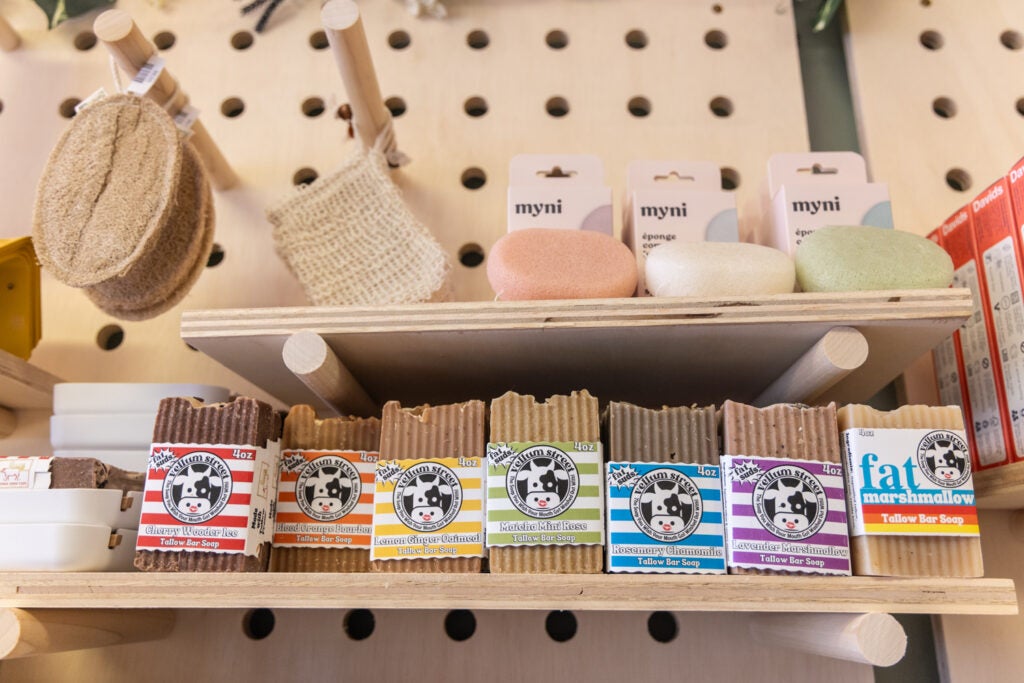
Torre said Vellum Street is committed to local and regenerative agriculture.
“About 90% of our ingredients are sourced from within 100 miles of Philadelphia,” Torre said.
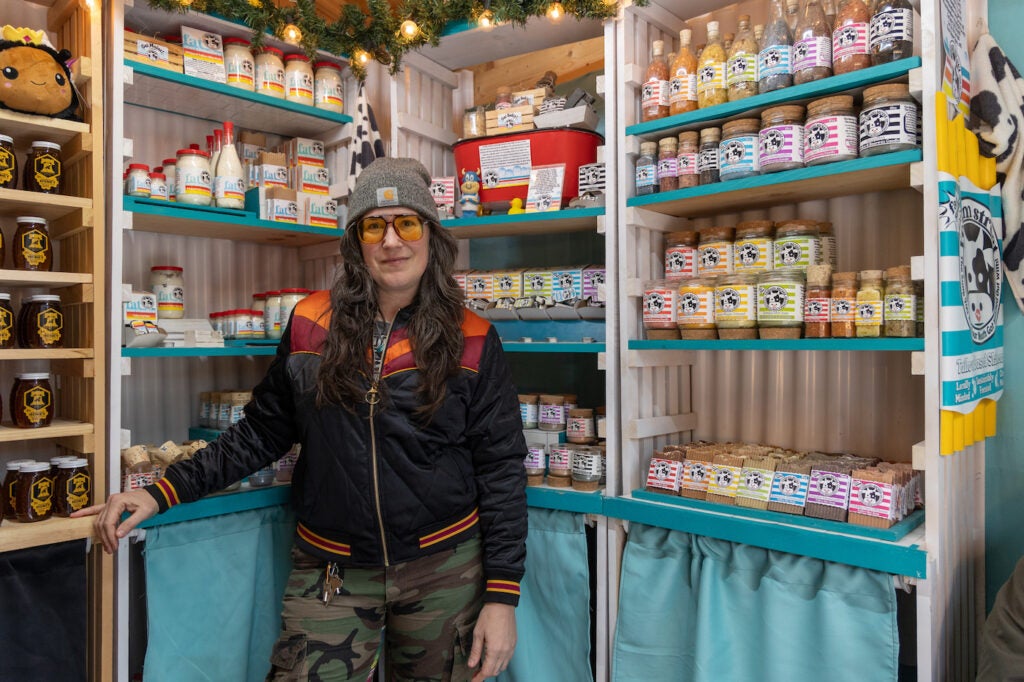
Vellum Street incorporates ingredients into its soaps like citrus peels, tea leaves, flowers and coffee grounds—items that normally would end up in the trash. It packages its products with reused and sanitized glass.
“We have a really close relationship with all of the people we source from as well,” Torres said. I’ve been to their farms and I’ve seen their operations. I know where it comes from.”
Celebrating Earth Week
More related reads from WHYY News and WHYY’s “The Pulse”
Good Buy Supply
Emily Rodia and her husband Jason Rusnock, struggled to find shops that sold items like bamboo toothbrushes, bar soap and shampoo bars in Philadelphia. Not finding any, they opened their own sustainable general store and refillable bulk shop in South Philly in 2020.
Good Buy Supply mainly sells household essentials like soaps and laundry detergent.
“So anything that you would need or could need to make an easy transition to something more sustainable, we’re trying to stock,” Rodia said. “We have about 40 different refills right now, and about 400 different unique products in the store.”
Good Buy Supply sources from all small companies on a closed-loop system, meaning that companies that sell to Good Buy Supply ship their products in 30-gallon or 5-gallon buckets that will then be picked up, sanitized and then reused. It’s a way to reduce their own trash.
Rodia has advice for those just starting to reduce their individual waste.
“You’re gonna be bombarded by a lot of different advertising and ads and things claiming to be sustainable, definitely do your research and small simple changes are the best changes,” said Rodia.
Shift
Moms Kimberley Bezak and Eleisha Eagle decided to open their full-service refill concept store Shift Sustainable Goods in Montgomery County around two years ago. It began as a small pop-up market with basic refillable items.
“We recently crunched the numbers for the shop and in a little over two years we’ve diverted over 38,000 containers from the landfill just from folks coming in and refilling and finding things package-free and making those sustainable swaps,” Bezak said. “That’s very exciting for our little community to be making that impact.”
Eagle said recycling is now a “broken system.” They hope to educate others and have Shift help consumers completely sidestep recycling. Shift’s goal is to make it as easy as possible to use refillable products and at the same time source locally and regionally while supporting minority and women-owned family-run companies.
They expanded to selling nonrefillable items in order to support Black- and women-owned small businesses.
Shift holds monthly events and workshops that help educate and teach people how to produce less waste. But Eagle said she’s wary of what large corporations are saying about recycling and refillable products.
“The unfortunate thing is they are just using that as marketing, which we call greenwashing, to try to sell their products,” said Eagle.
Bennett Compost
Tim Bennett’s goal to compost his food waste seemed impossible while living in a South Philly apartment. So in 2009, he founded Bennett Compost, which now helps more than 6,000 households and businesses every week, picking up compostable waste door-to-door throughout Philadelphia.
“I think there’s a need and a desire for these kinds of services, and the next step is to look at ways to increase the access,” Bennett said.
Common compostable items such as apples, hair, and even newspapers can be placed in a bucket for weekly pickup via electric bikes and vehicles.
He estimated his business has kept more than 70 tons of material out of the landfill every month.

Get daily updates from WHYY News!
WHYY is your source for fact-based, in-depth journalism and information. As a nonprofit organization, we rely on financial support from readers like you. Please give today.


